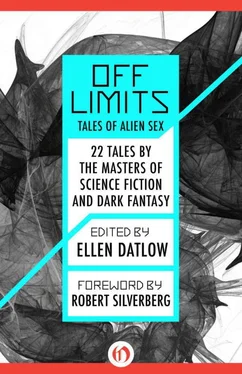I lifted the blanket. Blood had completely soaked her torn skirt and the cot underneath was stiff with dried blood. No, I thought, the soldier wouldn’t want to use this bed. I pulled the blanket back up to her chin.
“They put other guns down there, too,” he said petulantly.
Alma was whispering again, her dry lips scarcely parting for the words. “It takes sides.”
“What does, sweetheart?”
“Evil.”
“We can talk later,” I said. It was a stupid, stupid thing to say, but I kept on repeating it, even as her eyes fluttered open and stayed open.
“I have my money right here,” the boy said impatiently. “Are you a lucky whore, too? Will you make me strong?”
I stood up, turning my back to Alma. Now I looked at the boy. What have I felt for my patrons? Apathy, mostly. Passion, sometimes. Affection rather less often. Now I was having my first taste of simple, blue-white hate. I had always been dispensing strength: to the doctors who had gone back rejuvenated to their jars of pickled organs; to the judges who had returned to the bench with the fortitude it takes to put a man to death or to grant him his life. Perhaps they had all been good men; perhaps they had all been bad. How could I know? They never asked me how the strength I gave them was to be used.
The soldier was waiting for his treat. I gave him a hard kick to the privates then scrambled towards the ladder, his screams—“Bitch! Bitch!”—in my ears. I was near the top rung when I felt the ladder tremble with the soldier’s weight. I flung myself over the sandbags of the parapet, rolling onto the stone-sharp ground. I took out the last bomb. Evil is not moderate, I thought; how can I be? I yanked the pins out and lobbed the bomb into the pit.
After making my way back to Barcelona, I made the journey back home, leaving Franco’s nightmare forever, or so I thought. For a time, impressions of Spain sank into the haze of a civilized life: daytrips on trains that ran to schedule; walks along the white brows of cliffs, through meadows where the breezes comb wild-flowers into the grass. Sometimes and without warning, the faces of Alma and Gary would flicker and focus and the haze would lift. Then I would find myself driving my motorcar, careering down every street in London; driving in all weathers, at life-or-death speeds; trailblazing through alleyways to make a new shortcut; learning to read the city as if its streets were braille. Now, when the streetlamps dim to tiny embers and housewives draw the black shades down, when the city is as dark as a hillside in Spain, I steer an ambulance by the light of falling bombs.
The Lucifer of Blue
Sherry Coldsmith
This story is a confluence of fed-ups. Mainly, I was fed up with the way that prostitution is often represented in genre fiction. Before he was assassinated, Benigno Aquino said that whenever he wanted to take the measure of a city’s economic health, he would visit its red-light district and count the prostitutes. Aquino’s sensitivity to cost-benefit calculations is downplayed in much fiction, where romantic love is often seen as the cure for prostitution. By all indications money would be a far more reliable remedy. I was also fed up with Coach, the mass noun I give to the teachers I had back in high school. Coach taught only the Orwell of Animal Farm, suppressing the radical journalist who had fought against Franco.
Armed with my disgruntlements, and with a long-standing desire to set a story in the Barcelona of Orwell’s Homage to Catalonia, I sat down to juxtapose mercenary soldiers of sex with idealistic soldiers of war. I felt sure that evil would declare its allegiances in the process. I hope I was right.
The Queen of the Apocalypse
SCOTT BRADFIELD
Scott Bradfield is the author of five novels, including What’s Wrong with America, Good Girl Wants It Bad , and The People Who Watched Her Pass By , and two books of short stories, Greetings from Earth: New and Collected Stories and Hot Animal Love: Tales of Modern Romance . His fiction, essays, and reviews have been published in the Times Literary Supplement, TriQuarterly, The Pushcart Prize XVIII: Best of the Small Presses, Black Clock, The Picador Book of Contemporary American Stories , and the New York Times Book Review . He has written several screenplays, including the script for the film adaptation of his short story “The Secret Life of Houses;” the film received the Viewer’s Choice Award at the Rotterdam Film Festival in 1997. In 2001, he was Samuel Fischer Visiting Professor of Literature at the Free University of Berlin. His recent short film, Greetings from Earth , has been shown at several film festivals throughout the United States and Europe, including the Tribeca and Los Angeles film festivals.
Bradfield lives in London and walks a small white dog in Russell Square.
HARRIET OWEN SPENT HER youth making love to other women’s husbands. She spotted them in supermarkets and shopping plazas, and trapped them with her formidably blue eye-contact. While they solemnly pretended to inspect frozen food and sports equipment, Harriet provided them quick opportunities to introduce themselves, and redetermine who they were while their wives weren’t around. Eventually there occurred brief lapses into soft words, too many margaritas and cigarettes, crying over telephones, sex in elevators. Then, as abruptly as recognition, the harried men went away again. Disconnected their office telephones and sent Harriet personal checks in the mail. For Harriet, affairs with married men were a sort of clock. Whirr, tock, tick. As a result, Harriet always knew what was happening in her life, and what would happen next.
Hardness was no stranger to Harriet, and neither was remorse. “You are not a good girl,” her mother used to remind her. “You are not loving, or compassionate, or true. You never help with the housework, or care how I’m feeling. You never prepare meals for me unless I ask.” Sometimes Harriet’s mother would disappear for days and weeks at a time, returning with an ostentatious clatter of keys in the middle of the night, a bag of groceries under one arm, a six-pack of beer under the other. And it was always Harriet’s turn to cook breakfast.
Harriet’s mother liked to say that she had been an Abstract Expressionist long before being an Abstract Expressionist became popular. All day long she smoked marijuana out of a corncob pipe and wore a loose-fitting terry cloth bathrobe, gazing blurrily at her uncompleted canvases as if she couldn’t tell them apart. Their large studio contained two mattresses, three splintering wooden benches, large enormous rolls of medium-grain canvas, knock-kneed stepladders, framing boards, and countless rusting splattered paint tins stacked everywhere in weird configurations—pyramids, crosses, triangles, and ellipses—as if someone, somewhere, secretly intended them to mean something.
Harriet left home when she was seventeen, moved to North Hollywood, and spent every night sitting on the floor of her unfurnished apartment gazing at the palms of her hands as if they were paintings on a wall. She wanted to know the things her mother never thought her capable of knowing, those things they hadn’t taught her in school. She didn’t want to be just plain old know-nothing Harriet anymore, because she wanted to be better, and wiser, and filled with more meaning than herself. “You can’t see beyond the world you live in, which is why you will always be sad,” her mother used to tell her. “Now stop crying and go to sleep.”
Some nights Harriet clipped at the blue veins in her wrist with a pair of pale, dull scissors until the blood came. She did things to her toenails with matches and cauterized sewing needles. She gripped metal table knives and inserted them into the sudden frisson of bulbless lamps and open sockets. This, Harriet wanted to remind herself, was pain and attention. This was what happened when you were bad. A remote bright sensation of inflexibility and heat. A sort of visceral information. When Harriet felt pain, she didn’t feel lost, she knew where she was. She realized there was a world outside, a world that wanted her, a world that would hold her in its arms.
Читать дальше












